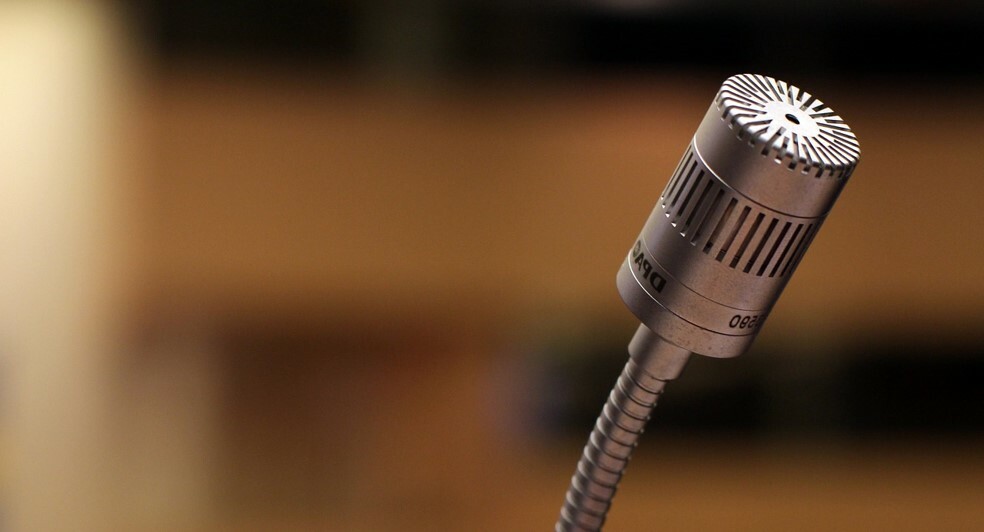…and the next speaker is…

As the anticipation builds and the seconds tick away, the session chair ends their intro, and a familiar sensation sets in – the heart races, palms sweat, and doubts creep in. Yes, I am the next speaker. I vividly remember this feeling at my first presentation at a national conference during the first year of my PhD. And this keeps on happening.
So, what exactly is presentation anxiety? We need some definitions. It feels like your heart is racing, it feels like you have forgotten everything you wanted to say, and it feels like you can collapse at any moment. This type of anxiety involves the body's physiological reaction to stress, often referred to as the "fight or flight" response, orchestrated by the sympathetic nervous system, and it is typically aimed at preparing the body to confront threats. However, the difference here is that there are no life-threatening situations to deal with, as much as it seems like there are. Does it sound familiar?
Based on direct experience and also many discussions with peers, I have concluded anxiety affects a lot of scientists, and it evolves (rather than fades, as I wished) in one’s career. As a student, it may be related to how you feel before an exam due to the fear of lack of knowledge or preparation. The performance of the talk, the language used, and the physical stance are not a big problem then; they are only secondary parameters while the main goal is to pass the exam. As a PhD student, it could arise from the fear of not having good enough results or progress. Also, in this case, parameters such as presentation style or language are secondary to the delivery: what matters, by and large, is to show that one has been productive enough. After all, the overall direction of the project and its responsibility lay on the PI (very broadly speaking). As a postdoc, things start to change. As the “scientist” persona starts to take shape, one feels more pressure to deliver. The clarity of the language, especially for non-native English speakers, is essential, and the style becomes a defining feature. In addition, as the project starts to take a more personal direction, there is more to show than simply the data. The audience is often more critical, and they expect more. As a PI, the responsibility increases, and while one has gained some practice, presentations become 360°performances when scientific content matters as much as how the message is delivered. Especially nowadays, presentations include skills in voicing, visual engagement with the audience, appropriate pausing, and, of course, excellent slides, given that user-friendly graphical tools are available to us. Each of us should be Ted material!
The reason why even the most prepared of us could experience some degree of anxiety before (or during) a talk is that we feel exposed, vulnerable, and judged (sometimes, this is not just a feeling, but the actual purpose of the presentation, then called “interview”). The more we progress in our career, the more is at stake, and I found it indeed surprising that the degree of anxiety I experienced increased, rather than decreased, when I got my first PI position. This is an indication that we deeply care about what we do and that we want to do a good job. This is why this anxiety never ceases.
Of course, presentation anxiety is not only about what is at stake but can intersect with various factors such as gender, race, ethnicity, cultural background, socioeconomic status, and more. Recognizing and exploring these intersections is essential for gaining a comprehensive understanding of how presentation anxiety manifests and is experienced by different individuals. For example, societal expectations and stereotypes may impact how individuals perceive their own competence and performance in public speaking settings. As I said above, language is often a source of anxiety for me and many of my non-English colleagues. Cultural differences in communication norms, expectations, and attitudes toward authority can also shape how individuals experience and cope with presentation anxiety. Presenting at an interview when the panel is all perfect-accent-English-speaking can be intimidating if you have an accent and cannot stop gesticulating.
Based on the above, it seems that despite experience, most of us keep experiencing anxiety even at a more senior level, although the topic is not discussed very often since it is often seen as a weakness. The main difficulty here is that this issue is often tackled from a technical point of view. The main guidelines to avoid anxiety are to practice (practice, practice, practice), to know the topic, and to know the audience. Some advice goes even further and suggests imagining the audience naked! These are all solutions that, while excellent and really helpful, can miss the point. Anxiety, especially later in life, is not a problem of knowledge or expertise but is an emotional issue. Following this technical advice, when I was a postdoc, I used to practice a 20/30-minute presentation hundreds of times before the presentation. This helped me a lot, especially memorising the first few sentences, which gave me the confidence that even if I was jittery, I would know what to say. It also helped me with the language. Practicing became my anchor. However, I soon had to give up this comfort zone, as have many scientists out there. Due to numerous commitments, I would have to deliver sometimes very different presentations in the same week. I had to prepare sometimes last minute*. With this increasing tension between the urge to practice and lack of time, I was left cringing. What can I do now?
One illumination came when watching a video (the night before I was introducing a session at a conference) from an actor who said that, even after decades of stand-up comedy, he would still be anxious before entering the stage. He is not the only one: only last week, while watching the Italian song contest Sanremo, Fiorello, one of the best presenters in Italy, confessed that he has been suffering from stage anxiety for his entire professional life – something that one would have never imagined, considering his skills! These revelations hit me. Are these guys telling me there is nothing to do about it and that being anxious is normal? Well, yes, this is precisely what I will say to you. If you are familiar with mindfulness this may sound not so crazy. Anxiety is another of those fleeting emotions that often possess us, but the minute we acknowledge it and stop fighting, it may set us free.
In conclusion, unfortunately, I don’t have a magic tip to get rid of presentation anxiety, and I wish I had. The solution I am proposing is that it is an inevitable consequence of our devotion to the job, and we need to treat it as any other feeling we experience. Of course, preparation is vital, but the best solution I found is just to face it, let it come and let it go. This is what resilience sounds like. I found that practicing mindfulness could be very powerful in navigating these fleeting sensations and avoiding their personification. So, you can try (and stop imagining the audience in their pants). Finally, what was essential for me was the support from my peers. Just talking to my colleagues and learning about their experiences made me realize how common this is and that, eventually, we are all in the same boat of sweating palms and racing hearts**. If you pay enough attention, you can actually hear this at a conference.
In the words of Andy Dufresne from The Shawshank Redemption film, “These walls are funny. First, you hate ’em, then you get used to ’em. Enough time passes, you get so you depend on them. That’s institutionalized.” Likewise, with presentations, first you dread them, then you get used to them. Eventually, through acknowledgement, acceptance, and the cultivation of coping mechanisms, we may end up depending on them.
*This made me realize why presentations of the most senior PIs are often not as polished as those of the younger scientists. There is no or little time to prepare. But this is actually not a good excuse either.
** Still, if you find this anxiety really paralyzing or that it makes your experience really bad, do seek professional advice.
Top image of post: by Maike und Björn Bröskamp from Pixabay





Join the FEBS Network today
Joining the FEBS Network’s molecular life sciences community enables you to access special content on the site, present your profile, 'follow' contributors, 'comment' on and 'like' content, post your own content, and set up a tailored email digest for updates.